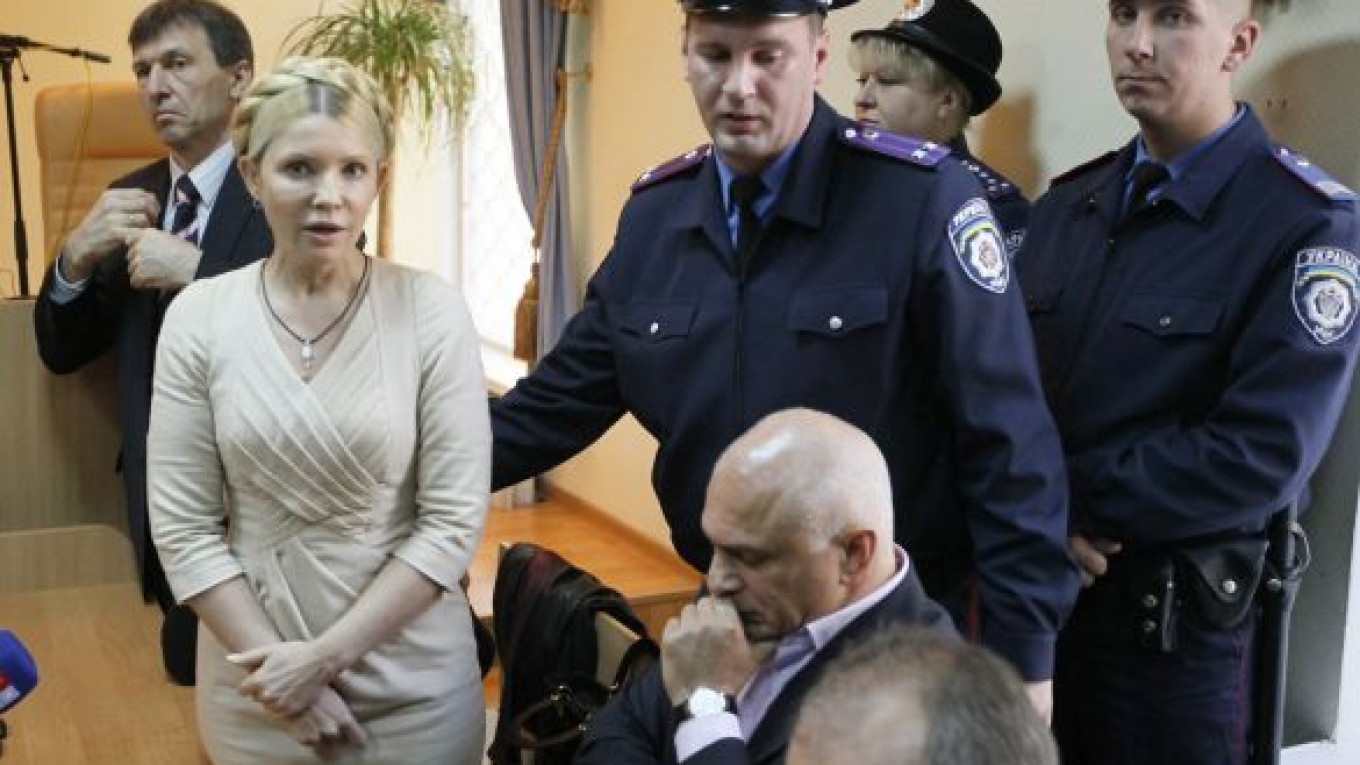Prime Minister Vladimir Putin warned that a Ukrainian court's decision to convict former Ukrainian Prime Minister Yulia Tymoshenko on Tuesday over a gas trade deal she brokered with Russia could endanger energy ties between the two countries.
A Kiev court sentenced Tymoshenko to seven years in jail for exceeding her authority in shepherding through a contract to end a bitter dispute that left parts of Europe freezing in the dead of the winter almost three years ago.
The January 2009 deal that forced Ukraine’s energy company Naftogaz to pay Gazprom a steep price is in “full compliance” with Russian, Ukrainian and international law, Putin said during a visit to Beijing. He warned that it was “dangerous and counterproductive” to question the agreement.
The Foreign Ministry echoed his comments, stating in response to the verdict that the Kiev court ignored “compelling evidence” in favor of the contract’s legal impeccability.
“We can’t fail to note the obvious anti-Russian subtext in this whole story,” the Foreign Ministry said in a statement. “As a matter of fact, Tymoshenko went on trial for legally binding agreements … that are in force and that nobody voided.”
Ukrainian President Viktor Yanukovych, under whose administration the case was opened, appeared to alienate European Union political leaders as well. EU foreign policy chief Catherine Ashton described the verdict as a deeply disappointing testimony of selective application of justice, and said it jeopardized the country’s further cooperation with the bloc.
Gazprom said its chief, Alexei Miller, held a meeting with Ukraine’s energy minister, Yury Boiko, and they agreed to adhere to the current contract until reaching any new agreements. The issue will likely be on the table when President Dmitry Medvedev meets Yanukovych at an interregional economic forum in Donetsk next Tuesday.
The office of Darya Chepak, Yanukovych’s spokeswoman, did not comment on what effect the ruling will have on the gas deal, when contacted Tuesday afternoon.
The ruling opens another way for Ukraine to press for a revision of the gas deal with Russia, a subject to which Moscow grew more conciliatory as the judge in Kiev approached his decision. Otherwise, Ukraine could now seek to annul the entire deal, said Andrew Neff, an energy analyst at IHS Global Insight.
Gazprom and Naftogaz stipulated in their contract that they would settle any disputes in the Arbitration Institute of the Stockholm Chamber of Commerce, but Ukraine could argue that if the contract were not valid, then the dispute resolution clause was not applicable either, Neff said.
“That would really open up some legal complexities, however,” he added, because Gazprom would likely insist on taking the matter to Stockholm arbitration.
Valentin Zemlyansky, an independent energy analyst in Kiev, said the verdict could trigger arbitration of the gas contract.
Yevgeny Minchenko, director of the International Institute of Political Research, a Moscow think tank, doubted that the court decision would serve as strong evidence in favor of Ukraine in a Stockholm arbitration. The EU outrage with Yanukovych will weaken his hand in talks with Moscow, he added.
Tymoshenko’s conviction comes after Yanukovych held a meeting with both Putin and Medvedev outside Moscow on Sept. 24, the same day the pair of Russian leaders announced they would attempt to swap jobs next year. The meeting followed months of saber-rattling, in which Ukraine threatened to take Russia to an international court in an effort to rip up the gas contract.
Two days after the meeting, Ukrainian Prime Minister Mykola Azarov announced that the two sides had agreed to revise the troublesome contract. Energy Minister Boiko’s visit to Moscow for gas talks Tuesday was the third since then. Gazprom consistently reported that the dialogue was constructive.
The Foreign Ministry said Tuesday that it hoped that the verdict would not disrupt these talks. The current contract ended a pricing spat between Moscow and Kiev that arose in January 2009 and resulted in reduced deliveries to Europe via Ukraine.
Putin, meanwhile, expressed confusion about sentence, saying, "I don't really understand why they handed her seven years."
But he showed no sympathy. "Tymoshenko for us, and for me personally, is neither a friend nor a relation," he said, Reuters reported. "Moreover, she is a political opponent, because she was always a political person of Western orientation."
Lucas I. Alpert contributed to this report.
A Message from The Moscow Times:
Dear readers,
We are facing unprecedented challenges. Russia's Prosecutor General's Office has designated The Moscow Times as an "undesirable" organization, criminalizing our work and putting our staff at risk of prosecution. This follows our earlier unjust labeling as a "foreign agent."
These actions are direct attempts to silence independent journalism in Russia. The authorities claim our work "discredits the decisions of the Russian leadership." We see things differently: we strive to provide accurate, unbiased reporting on Russia.
We, the journalists of The Moscow Times, refuse to be silenced. But to continue our work, we need your help.
Your support, no matter how small, makes a world of difference. If you can, please support us monthly starting from just $2. It's quick to set up, and every contribution makes a significant impact.
By supporting The Moscow Times, you're defending open, independent journalism in the face of repression. Thank you for standing with us.
Remind me later.






